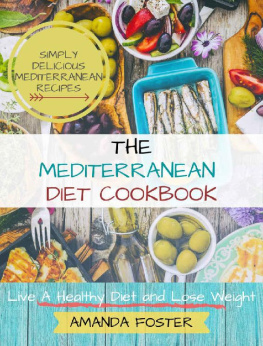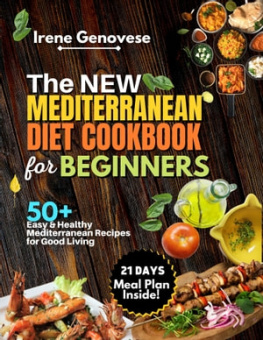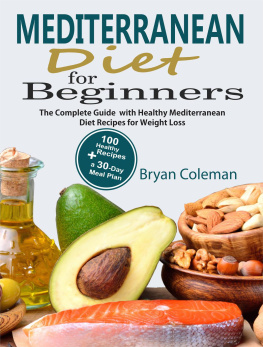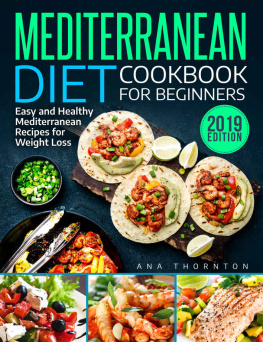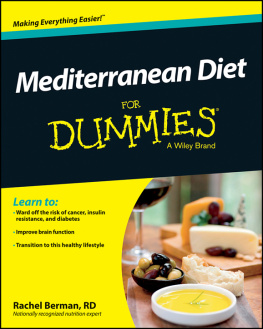Happy Like a Greek
Fill Your Life with Joy, the Mediterranean Way
By
Karen Guttridge
Text copyright 2016 Karen Guttridge
The author reserves all rights. No part of this ebook may be used or reproduced in any manner without written permission except in the case of brief quotations embodied in critical articles and reviews.
While all attempts have been made to verify the information provided in this publication, neither the author nor the publisher assumes any responsibilities for errors, omissions or contrary interpretations of the subject matter therein.
This book is for entertainment purposes only. The views expressed are those of the author alone and should not be taken as expert instruction or commands. The ideas and suggestions herein are provided as general information only and should not be construed as medical advice or care. Please consult your doctor or other health professional to determine whats best for you.
The reader is responsible for his or her own actions.
Table of contents
What do you want most in life? Ask any number of people and Ill wager that the most common answer will be to be happy.
If you think about it, you seek happiness in everything you do. Whether you strive for success at work, more money, a new relationship, the latest phone, car or whatever, you want these things because you believe that they will make you happy. And some of them do, especially relationships.
But, more often than not, this behaviour gets you into trouble. By chasing happiness you end up in a race for more and better and faster. Happiness is always just around the corner. After every spending spree your spike of happiness fades faster than a fake tan.
You cant work out why youre feeling so stressed and empty when you have everything you could possibly want.
Youre missing the point.
There is your way. And there is the Greek way.
Theres only one way to be happy.
Happiness is when your life fulfils your needs.
But that begs the question What are my needs? How can I find out what they are?
This book will help you to find out.
Everyone chases after happiness, not noticing that happiness is right at their heels.
Bertolt Brecht
Many behaviours that make up the Mediterranean lifestyle contribute to the long, healthy lives of the people but you don't need to move there to profit from it.
Go fully Mediterranean with my complete 'Like a Greek' series:
Eat Like a Greek
Happy Like a Greek
Happy Like an Ancient Greek
De-stress Like a Greek
Eat Mediterranean
Is it possible that what we eat can affect not only our physical health, but our levels of happiness too?
There is growing evidence that it can. A survey by the Food and Mood project, led by the mental health charity Mind, discovered that nearly 90% of people who took part found that changing their diet improved their mental health. Participants who cut out fast food and fizzy drinks - generally junk food and followed a Mediterranean diet rich in fresh fruit and vegetables plus beans, nuts and olive oil reported feeling happier.
In 1999, a group of doctors started looking into the effect of the Mediterranean diet on heart disease, diabetes and cancer in a group of 15,000 people. Uniquely, they also monitored their mental health.
The results suggested that the diet could prevent the occurrence of depression.
Charles Reynolds at the University of Pittsburgh found similar results.
He was interested in whether a course of psychotherapy could help to prevent the development of future mental health problems. He ran his study with a group of people who exhibited various risk factors known to be linked to the development of depression. Half the group received psychotherapy whilst the remaining participants received instructions on healthy eating.
Two years later the results came in. The people undergoing the psychotherapy had a reduced risk of developing depression but so had the healthy eating group who also reported feeling generally happier.
Looking after ourselves by paying attention to our nutrition in this way could be part of the reason for the reported boost in feelings.
Preparing more healthy meals is, in itself, a rewarding experience that boosts self-confidence, Dr Reynolds observed. You might then believe that you can cope with other difficulties and respond adequately.
But whatever the reason and although the link is by no means proven and more study is needed, it does appear that regular consumption of a Mediterranean-style diet seems to markedly improve our mood. There is room for cautious optimism.
Many scientists believe it's all to do with inflammation.
The first thing to realise is that, far from being the big baddie, inflammation is essential in order for the body to be able to heal itself. When your body detects injury or something harmful or irritating, it will spring into action and try to remove the disturbance. An army of cells stream to the site of harm and 'attack' the potential invader.
Imagine you've just been bitten by an insect. Your body will sense the irritation and send in the troops in the form of a stream of white blood cells which act to limit the spread of any foreign material. The area swells with the accumulation of these cells and also reddens with the increased flow of blood. This is what we call inflammation. Generally it is short lived or acute and after a few days the symptoms subside and all is well.
Thus, inflammation is not infection itself but your body's response to infection.
By contrast, long term or chronic inflammation is a different story. As the name suggests, it never turns off. The white blood cells are scooting around acting everywhere, as though your entire body is in urgent need of repair. This type of inflammation has been linked to a whole host of conditions such as heart disease, arthritis and cancer.
Chronic inflammation has been linked to our diet.
Harvard Medical Schools Family Health Guide states that what you eat can fuel or cool inflammation.
We are discovering that overly processed foods which are high in sugar and saturated fat can spur inflammation. This has led to the labelling of such foods as 'pro' inflammatory. By contrast, 'anti' inflammatory foods do not provoke the unwanted response.
Dr Cannon, Harvard Professor of Medicine says that the ideal anti-inflammatory diet is "probably very close to the Mediterranean diet."
Eat Mindfully
I was nineteen years old and on holiday in Greece when a snail headed my way skewered on the end of the long, curved fingernail of yiayia (grandmother) Maria.
I recoiled in horror. The old lady hooted with laughter and, not to be deterred, tried me for size with a fat, juicy olive instead. Delivered fingernail style.
Then, to my eternal relief she pushed the tiny bowl of glistening olives that lay on the table between us, over towards me.
I took an olive. I understood that there was to be a lesson here so I watched and learnt.
Maria lifted the olive, still fingernail-spiked, towards her mouth and nibbled mouse-like at its tip. I followed suit. And waited. Again she took a few more tiny pecks of the fruit and we continued taking turns in this way until our olives were no more.
Maria grinned and smacked her lips in satisfaction.
I didnt know it then, but it was my first experience of mindful eating.
Mind less Eating
I'm sure you can relate to having eaten a plate of food and not really tasted any of it. Not, in fact, even noticed that you were picking away. We live fast and eat fast.
I once observed a colleague at work in front of her computer. She had a glass bowl on her desk into which she'd tipped a large bag of mixed nuts and raisins. Throughout the morning she picked constantly at the contents of the bowl. Every time she used the computer mouse she popped a snack into her mouth. Click, crunch. Click, crunch.
Next page

